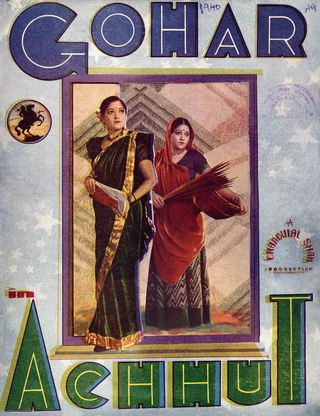
Achhut is a 1940 social Indian Bollywood film based on untouchability. It was the third highest grossing Indian film of 1940. The film was produced by Chandulal Shah for his Ranjit Studios. He also wrote the story and screenplay, and directed it. Achhut's premiere was attended by Sardar Vallabhbhai Patel on 23 December 1939, who stated: "If the picture helps India to remove this curse, it can be said to have helped India to win Swaraj as untouchability is one of the chief obstacles in the road to freedom".

Pagal is a 1940 Indian Hindi-language film. It was the fourth highest grossing Indian film of 1940. The psycho-social melodrama was directed by A. R. Kardar for Ranjit Movietone. Kardar also wrote the dialogues and story for the film. Khemchand Prakash composed the music with lyrics written by D. N. Madhok. The film's protagonist was Prithviraj Kapoor playing a doctor with psychological problems, working in a "lunatic asylum". The rest of the cast included Trilok Kapoor, Madhuri, Sitara Devi, Noor Mohammed Charlie, Khatoon, and Sunalini Devi.
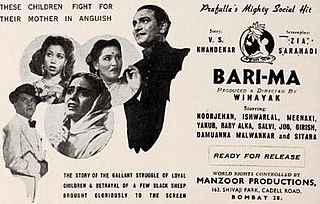
Badi Maa , also called Bari-Ma, is a 1945 Indian Hindi-language war drama film. It was produced and directed by Master Vinayak. Made under the banner of Prafulla Pictures, Kolhapur, it had story written by V. S. Khendekar. Zia Sarhadi wrote the screenplay and lyrics for six songs. The other lyricists were Anjum Pilibhiti and Raja Badhe. The music director was K. Datta.
Musafir is a 1940 social Hindi language film directed by Chaturbhuj Doshi. Produced by Ranjit Studios, the music was by Gyan Dutt and it starred Noor Mohammed Charlie, Khursheed, Ishwarlal and Yakub.
Bambai Ki Sair also known as Holiday in Bombay is a Bollywood social comedy film. It was released in 1941 and directed by Sarvottam Badami for Sudama Productions. The music direction was by Khemchand Prakash with lyrics by D. N. Madhok, Munshi Dil, B.R. Sharma and Pandit Indra. The film starred Shobhna Samarth, Sabita Devi, E. Billimoria, Jal Merchant, Arun, Vatsala Kumtekar Kantilal and Ghory.

Maheman is a Bollywood film. It was released in 1942. The film was produced by Ranjit Studios and directed by Chaturbhuj Doshi. The film starred Madhuri, Ishwarlal, Mubarak, Bhagwandas and Shamim Bano. The music was directed by Khemchand Prakash, with lyrics by D. N. Madhok.

Bansari is a Bollywood social film. It was released in 1943. Music composition was by Gyan Dutt with lyrics written by D. N. Madhok. The film was produced by Chandulal Shah for Ranjit Studios. Directed by Jayant Desai, it starred Ishwarlal, Noor Mohammed Charlie, Dixit, Shamim Bano, Kesari and Urmila.

Watan (transl. Homeland) is a 1938 Hindustani costume drama film directed by Mehboob Khan. Produced by Sagar Films, the film had story by Mehboob Khan and Wajahat Mirza. The cinematographer, as for most Sagar films, was Faredoon Irani. Following the successful music of Manmohan (1936), Sagar Movietone retained Anil Biswas as the in-house music director, scoring music for Watan along with other releases of the time from the studio. The cast of the film included Kumar, Bibbo, Maya Banerjee, Yakub Lala, Sitara Devi and Kayam Ali.
Kokila (transl. Nightingale) is a 1937 Hindi social family drama film directed by Sarvottam Badami. The music was composed by Anil Biswas with lyrics written by Siddiqui and Zia Sarhadi. The story was adapted from the well-known novel Kokila, written by Gujarati writer Ramanlal Vasantlal Desai. The film starred Motilal, Sabita Devi, Shobhna Samarth, Maya Bannerjee, Sitara Devi, Pesi Patel, Siddiqui and Kayam Ali.
Sajani is a 1940 Hindi social film directed by Sarvottam Badami for Sudama Productions. Scripted by Zia Sarhadi, the film had music by Gyan Dutt and starred Prithviraj Kapoor, Sabita Devi, Snehprabha Pradhan, Noor Jehan, Dixit, and Ghory. Badami left Sagar Movietone where he had made satirical comedies to join his "mentor" Ambalal Patel at Sudama Productions to make "socially relevant film(s)", where Sajani was one of the first. Snehprabha Pradhan acted in several films produced by Chimanbhai Desai in 1940, including Sajani.
Chingari (transl. Embers) is a 1940 social Hindi film directed by Sarvottam Badami. Made under the banner of Sudama Productions, the film had music by Gyan Dutt. Prithviraj Kapoor shifted from New Theatres Ltd. Calcutta to Bombay, where he worked under Badami in two films, Sajani and Chingari both made in 1940. The cast included Prithviraj Kapoor, Sabita Devi, E. Billimoria, Meera, Khatoon and Keshavrao Date.
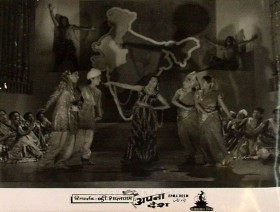
Apna Desh is a 1949 Hindi social drama film set against the backdrop of Partition and directed by V. Shantaram for his Rajkamal Kalamandir banner.

Sawan Aya Re is a 1949 Hindi romantic drama film, directed by Kishore Sahu. Produced by Sahu under his "Hindustan Chitra" banner, it had Khemchand Prakash as the music director. The cast included Kishore Sahu, Ramola Devi, David, Pratima Devi, Ramesh Gupta, Sofia and Mohana.

Baghban (Gardener) is a 1938 Hindi/Urdu family drama film directed by A. R. Kardar. The story was by Begum Ansari with script and screenplay by Kardar. Film's music was composed by Mushtaq Hussain with lyrics by Mirza Shauq. The cast included Nandrekar, Bimla Kumari, Nazir, Sitara Devi, K. N. Singh, Wasti and Ashraf Khan.
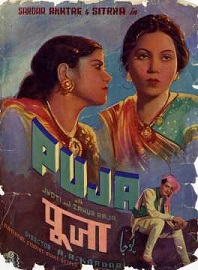
Pooja (Worship) is a 1940 Indian Hindi/Urdu-language psychological drama film directed by A. R. Kardar. The music director was Anil Biswas, with lyrics by Khan Shatir Ghaznavi. Produced by National Studios, the story, screenplay and dialogue writer was M. Sadiq and the cinematographer was P. G. Kukde. The film starred Sardar Akhtar, Zahur Raja, Sitara Devi, Jyoti, Sankatha Prasad, Sunalini Devi, Bhudo Advani and Baby Meena.

Thokar also called The Kick is 1939 Hindi/Urdu film directed by A. R. Kardar. Produced by Chandulal Shah for his production banner Ranjit Movietone, it had music by Gyan Dutt. The story writer was M. Sadiq, with cinematography by Gordhanbhi Patel. The cast included Kumar, Ishwarlal, Madhuri, Yakub, Noor Mohammed Charlie, Ram Marathe, Waheedan Bai and Dixit.

Milap (transl. the union is a 1937 Indian Hindi/Urdu-language social drama film directed by A. R. Kardar. Produced under the Moti Mahal Pictures banner, it had music composed by K. C. Dey. Milap was a big success for the actress Rampyari.

Chaturbhuj Doshi (1894–1969) was a Hindi and Gujarati writer-director of Indian cinema. He was one of the top Gujarati screenplay writers, who helped script stories for the Punatar productions. He is stated to be one of the leading figures who launched the Gujarati film industry with work on notable films like Gunsundari (1948) and Nanand Bhojai (1948). Doshi, was “well known” for his family socials and had become “a celebrity in his own right”. He made a name for himself as a journalist initially and was referred to as the "famous journalist" and publicist by Baburao Patel, editor of Filmindia.
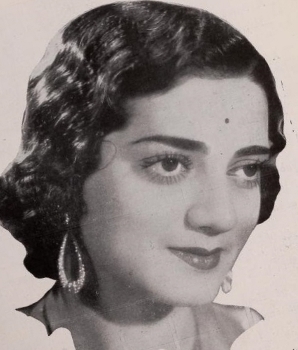
Sabita Devi (1914–1965) was a Hindi film actress in Indian cinema. She is stated to be one of the "prominent" leading ladies of the "pioneering era" of Indian cinema along with Mehtab, Bibbo, Durga Khote, Gohar, Devika Rani and Seeta Devi. A Jewish by birth, she changed her name to find acceptability in Hindi cinema like the other Anglo-Indian and Jewish actresses of her time, Sulochana, Seeta Devi, Madhuri, and Manorama. After initially working with British Dominion Films Ltd., Calcutta, she shifted to Bombay and performed mainly in films produced by Sagar Movietone with her co-star in most films being Motilal. Some of the popular films with Motilal were Dr. Madhurika (1935) and Kulvadhu (1937) directed by Sarvottam Badami. Their first film together was Shaher Ka Jadoo (1934), which was also Motilal's debut film, and then Lagna Bandhan (1936) both directed by Kaliprasad Ghosh. She acted in Silver King (1935) with Motilal. It was an action film directed by C. M. Luhar, which became a "huge success".

Mazhar Khan was an actor, producer, and director in Indian Cinema. He began his career as a police officer, which he left to study law for a short period. After abandoning his studies, he came to Bombay and started his career in cinema with the silent film Fatal Garland (1928) opposite the top actress of the time, Ermeline. He became a popular actor, gaining success in several silent films. During his stint in silent films he worked with directors such as Bhagwati Prasad Mishra, Ezra Mir, Moti P. Bhagnani, R. S. Chowdhary, and M. D. Bhavnani. Magazines in the 1940s compared Khan to Hollywood actors such as Paul Muni, Bela Lugosi and Boris Karloff.
















